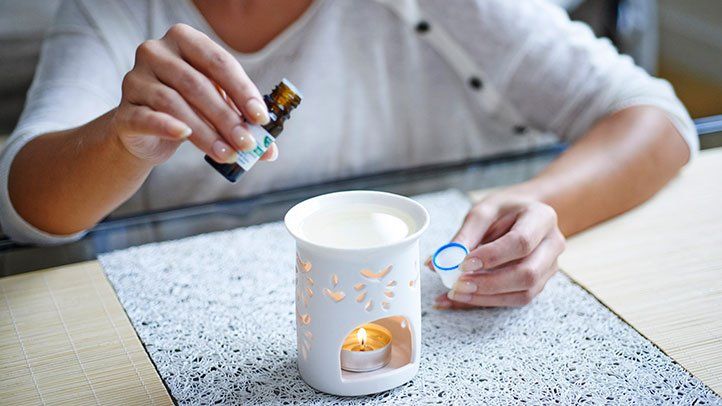The stress-psoriasis relationship can be reciprocal. Stress often plays an important role in psoriasis by triggering flares and exacerbating symptoms. At the same time, a psoriasis flare can bring on or worsen stress and anxiety.
For this reason, stress management can be an important aspect of managing psoriasis, according to Neil Korman, MD, PhD, the director of the Murdough Family Center for Psoriasis at University Hospitals Cleveland Medical Center. He says mind-body practices may be a helpful addition to your psoriasis treatment plan.
Mind-body practices include meditation, biofeedback, aromatherapy, and cognitive behavioral therapy (CBT), which have the potential to help “reduce stress and better manage psoriasis,” Dr. Korman says. Here’s how.
1. Meditation: Quiet Your Mind to Relax Your Body
There are many ways to meditate, most of which have roots in ancient Eastern spiritual practices. Some techniques involve sitting in a quiet place and focusing on your breathing. Others meld meditation with physical movement, such as walking meditation and tai chi.
A review of research found that meditation and mindfulness could be beneficial as an add-on therapy for people with psoriasis. While more studies are needed, according to the review, five of six randomized controlled trials showed improvement in severity of symptoms after mindfulness interventions.
2. Biofeedback: Meditation Meets Technology
Biofeedback is a technology in which a therapist attaches electronic sensors to specific parts of the body. The sensors are able to measure blood pressure, heart rate, muscle tension, body temperature, and other physiological functions that change in response to stress. This allows you to receive in-the-moment feedback about how a stress-reduction practice such as deep breathing or muscle relaxation is working, so you can learn to use these tools more effectively.
Plenty of research shows biofeedback can lower stress. But less is known about its direct impact on psoriasis.
There is some evidence, though, that it may be promising as part of a holistic approach to psoriasis management. For example, a study of 40 participants found those receiving phototherapy had better results after eight weeks if they also used biofeedback and cognitive-behavioral therapy. And studies have shown that biofeedback helped lessen the severity of other skin diseases.
3. Cognitive Behavioral Therapy: Counter Negative Thinking
Cognitive behavioral therapy, also known as CBT, involves exploring with a trained therapist how your thoughts, feelings, and behaviors interact. The goal of CBT is to reveal negative patterns of thinking that lead to stress and teach skills for changing those thought patterns.
4. Spa Therapy: Soak Away Stress and Soften Skin
A salt bath combined with phototherapy essentially mimics the Dead Sea experience of sunbathing and soaking in seawater, which is known to be beneficial to psoriatic skin.
You can tap into the stress-reducing benefits of spa therapy by adding Dead Sea or Epsom salts to a warm (not hot) bath at home. Limit your dip to 15 minutes, and rinse off quickly when you get out of the tub. Slather on moisturizer while your skin is still damp, to keep the salt and minerals from drying out your skin.
5. Aromatherapy: Breathe in Soothing Scents
Aromatherapy is a complementary practice in which essential oils derived from plants are used to bring about healing, promote relaxation, and improve overall well-being. The scents can be diffused into the air, applied by adding them to massage oil, or added to bathwater to enhance a soak in the tub.
No matter how a scent is delivered, it’s thought to send chemical messages to mood and emotion centers of the brain. There’s a fair amount of evidence that scents work in any number of situations. For example, a review of research found that certain scents relieved anxiety during pregnancy and childbirth. Especially effective were lavender, petitgrain (bitter orange), and bergamot. Another study found that aromatherapy with lavender essential oil effectively reduced the physical and psychological stress of nurses during the COVID-19 pandemic, providing not only immediate effects but lasting benefits.
It stands to reason these same oils might be calming for anyone experiencing stress, including someone with psoriasis. One word of caution: Pure essential oil may be irritating or even trigger a flare when applied directly to the skin. To be safe, talk to your doctor before using any oil in this way or stick with sniffing as a way to stick it to stress.
The Takeaway
- By soothing stress, mind-body practices such as meditation, biofeedback, and cognitive behavioral therapy may alleviate psoriasis symptoms.
- A 15-minute soak with Dead Sea or Epsom salts followed by moisturizing can mimic the therapeutic effects of a spa, helping to reduce psoriasis plaques.
- While aromatherapy has shown promise in relieving stress, direct application of essential oils to the skin may cause irritation; consult your healthcare provider before use.
- These complementary therapies aren’t a substitute for medical treatment. If your psoriasis symptoms persist or worsen, check with your doctor to safely adjust your treatment plan.
Read the full article here




